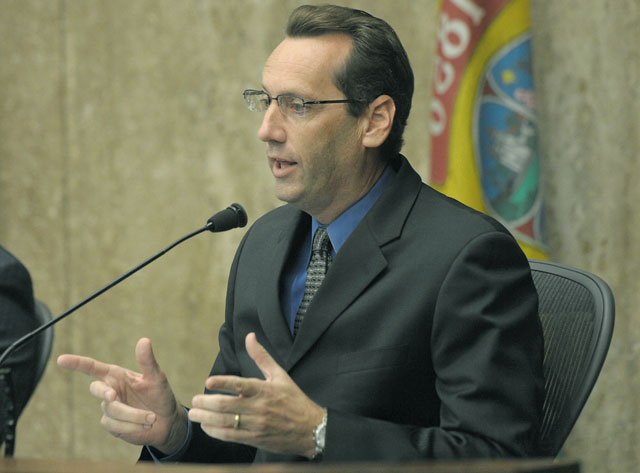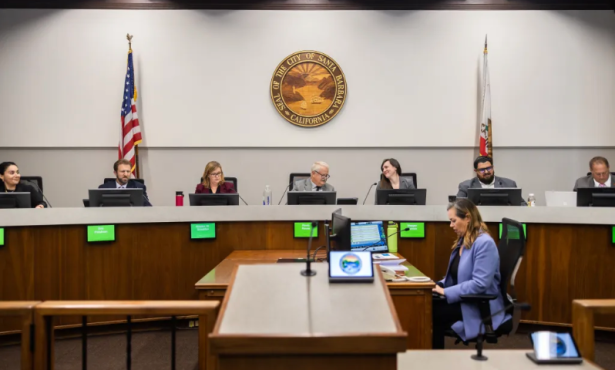Lavagnino Sends Letter to Congressman Sponsoring Camp 4 Annexation
S.B. Supervisor Says It's Important Doug LaMalfa Know the ‘Whole Story’

Supervisor Steve Lavagnino sent a letter earlier this week to Northern California Congressmember Doug LaMalfa, addressing his concerns with LaMalfa’s federal legislation to bring the Chumash tribe’s Camp 4 into trust while reminding the representative that the supervisors’ decision to oppose the tribe’s wishes was not a unanimous one.
On October 23, about a week after the tribe unsuccessfully argued its case for the fee-to-trust to the supervisors, LaMalfa introduced HR 3313, which would annex the 1,400-acre Camp 4 property into the existing Chumash reservation. The supervisors’ vote against annexation — which was opposed only by Lavagnino — came after public outcry and concern from board members that doing so would remove the property from the county’s tax rolls and land-use rules. The bill wouldn’t, however, permit the Chumash to build a casino or resort on the land; the tribe has long said it only intends to build housing.
Lavagnino has repeatedly argued, along with 1st District Supervisor Carbajal, that refusing to recognize the tribe as an equal government would leave them little choice but to seek legislative help, an option the tribe has long said was on the table. Lavagnino’s letter, dated December 16, reiterated that.
“While I cannot support HR 3313 in its current form, I understand why you have authored it and appreciate your inclusion of a non-gaming provision,” Lavagnino wrote. “During the hearings, I warned my colleagues that if we failed to recognize the tribe as a functioning government entity through official dialogue, it would lead to Congressional action such as HR 3313. At our most recent California State Association of Counties (CSAC) Conference, the governor’s expert on tribal relations indicated the best strategy in dealing with fee-to-trust applications is to ‘negotiate early in the process.’”
In his letter, Lavagnino took issue with a letter his colleagues sent to LaMalfa on October 30, after the legislation was introduced, announcing their disapproval of the legislation. In an interview Friday, Lavagnino said he “felt compelled” to send his own letter to the congressmember, given what he called the “one-sided opinion” presented in his colleagues’. “I thought it was important he know the whole story,” he said. “This is exactly what I was afraid was going to happen.”
“I would much rather see us sit down like adults and try to work something out,” he continued, adding that he didn’t like the idea of a politician from outside of the area making decisions that will affect Santa Barbara County.
A spokesman for LaMalfa did not return requests for comment. LaMalfa, a Republican who represents the state’s 1st Congressional District, received a $1,000 contribution from the tribe in the 2013-2014 campaign cycle.
Sam Cohen, the Chumash’s government affairs officer, said that although the tribe appreciated Lavagnino’s letter, it will not change the tribe’s current plans. “The only thing we’d prefer is for Supervisor Lavagnino to support the legislation as written,” Cohen said. “To date, the county refuses to talk, so we need to go forward with the legislation as is.”
Cohen also said that the tribe is “looking forward” to working with Lavagnino — a frequent Chumash supporter who has received several of their campaign donations — when he becomes the board’s chair in the new year, a veiled swipe at current chair Carbajal, who has also been a longtime ally of the tribe, minus his October vote to oppose the fee-to-trust.
The tribe, which purchased the Camp 4 property in 2010 from the late actor-winemaker Fess Parker, offered, in 2011, to pay the county $10 million instead of property taxes and also waive its sovereign immunity from lawsuits, but the supervisors didn’t go for it. “Instead of responding to the offer, our board decided that the tribe was not equal to other governments we commonly negotiate with, including local cities, Vandenberg Air Force Base, and the University of California at Santa Barbara,” Lavagnino wrote.
Lavagnino ended his letter by repeating his request that the issue stay in-county and that “the only way to accomplish that is by pursuing a legally binding agreement with the tribe that would offset future property taxes and allow the County of Santa Barbara to challenge some land-use decisions.” He wrote that he “will continue to push for constructive conversation” on the matter. “Without further negotiations, we are destined to incur all of the impacts without any share of the revenue.”
The supervisors’ October 15 vote to oppose the fee-to-trust through a letter sent the federal Bureau of Indian Affairs could mean that appeals drag out a final decision for years, pending the fate of HR 3313.



